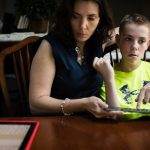If our nation’s cities and towns are going to be asked to do more and more, the pandemic partnerships and the progress we have made offer promise for a brighter future for our communities.
Under the guidance of Mansfield teacher and Neag School alumna Madison Corlett, grade four students who are learning remotely this year have engaged in a series of “passion” projects, including the gift card fundraiser. With a goal to raise $5,000, this group of students, representing all three Mansfield elementary schools, launched a Go Fund Me page, setting a goal to help local businesses who they had heard were struggling as a result of COVID-19
Public school enrollment in New England is down during the pandemic. But even when kids are enrolled, it can be a struggle to get some to show up. This week on NEXT, how one district is tackling absenteeism and why doctors are increasingly concerned about youth mental health. Plus, Massachusetts school districts try to cope with a teacher shortage. And when a Vermonter’s business plummeted after COVID hit, she donned an inflatable T-Rex costume and started dancing.
Children don’t come with how-to manuals. Even if they did, they would all require a manual of their own, tailored to their unique make and model. That’s why caregiving can be rewarding, as well as puzzling and demanding – particularly for family caregivers of children with disabilities. Although these caregivers often report that the role gives them a sense of purpose, it usually comes with physical, emotional and financial strains. COVID-19 has added major hurdles to accessing, delivering and evaluating special education services.
Children don’t come with how-to manuals. Even if they did, they would all require a manual of their own, tailored to their unique make and model. That’s why caregiving can be rewarding, as well as puzzling and demanding – particularly for family caregivers of children with disabilities. Although these caregivers often report that the role gives them a sense of purpose, it usually comes with physical, emotional and financial strains. COVID-19 has added major hurdles to accessing, delivering and evaluating special education services.
Sandra Chafouleas, a professor in the Neag School of Education at UConn, said that families should come up with a plan and schedule, including time away from all devices.
Today, we join the world in marking International Human Rights Day. Throughout this year, communities near and far have faced some of the most significant human rights challenges since the United Nations adopted the Universal Declaration of Human Rights in 1948.
“Students need more support to adjust to these new times,” said Clewiston Challenger, an assistant professor at UConn’s Neag School of Education. “So school counselors, by themselves, are doing more checking on students for mental health and wellness, providing more support and making sure they’re coming to school in a virtual setting, which then leaves college exploration to be also in the background and not a top priority, which is unfortunate.”
“Distance learning with elementary students is an entirely different experience from working with them in-person,” says Kimy Velasquez, a Neag School education student. “Everything I imagined my internship to me is different from what I expected. Despite this, there are still opportunities to learn and grow as an upcoming teacher in this new environment.”
Since the beginning of COVID-19, millions of students nationwide have been forced into online learning. Many of those experiences have been negative because of schools’ lack of preparation, because of some faculty not considering student needs, and because of financial stresses. Online learning is especially affecting students majoring in sciences, education, and the fine arts; international students and students living in different time zones; students from low-income families and students with disabilities.




